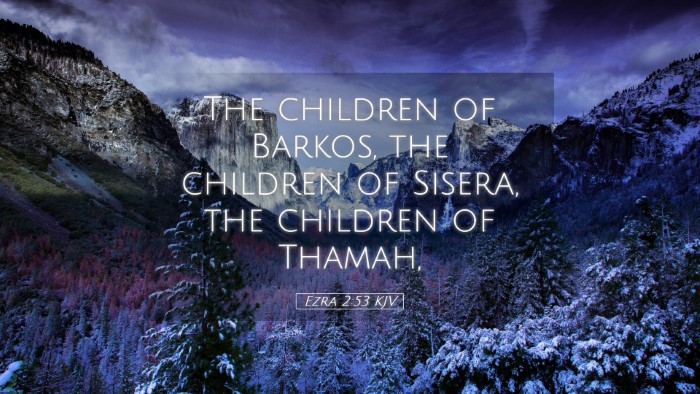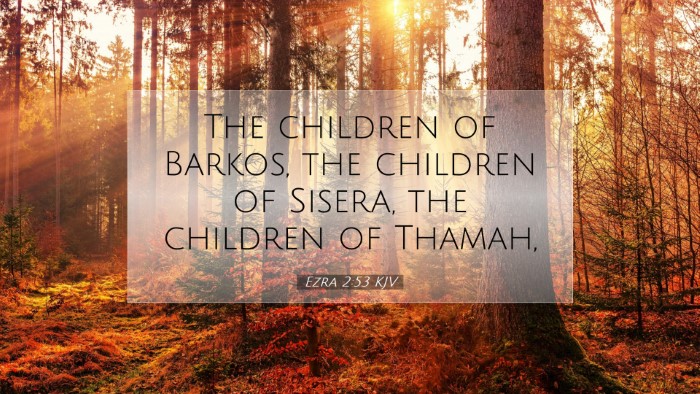Commentary on Ezra 2:53
Ezra 2:53 (KJV) reads: "The children of the gatekeepers: the children of Shalom, the children of Ater, the children of Talmon, the children of Akkub, the children of Hatita, the children of Shobai, in all an hundred thirty and nine."
This verse contributes to the larger narrative of the restoration of Israel post-exile, highlighting the importance of the gatekeepers in the re-establishment of worship and social order in Jerusalem. The detailed enumeration reflects the structure and organization necessary for communal life, especially in a time of rebuilding.
Insights from Public Domain Commentaries
Matthew Henry's Commentary
Matthew Henry emphasizes the significance of the gatekeepers in the temple service. He notes that these individuals held a vital role in maintaining the sanctity and security of the temple. Their duties were not merely functional but symbolic within the community of faith. Henry suggests that the inclusion of these names serves as a reminder of the faithfulness of those who served in lesser-known capacities, which are nonetheless essential for the orderly worship of God.
- Faithfulness in Duty: Henry points out that even the more humble roles, like that of a gatekeeper, are honored by God and should not be overlooked by the community.
- Order in Worship: The organization of the gatekeepers reflects the importance of order in worship, reinforcing the idea that God is a God of order and structure within His temple.
Albert Barnes' Notes on the Bible
Albert Barnes remarks on the specific mention of the "children of the gatekeepers," indicating not only the individuals but their lineage. This implies a continuity of service in the temple community, where roles were often inherited and passed down through generations. He stresses the significance of the gatekeepers in protecting sacred space and regulating who may enter, which underscores their crucial role in the community's spiritual life.
- Covenantal Identity: Barnes observes that the genealogical record serves to cement the identity of the Jewish people post-exile, reinforcing their covenantal relationship with God through tradition and family.
- Rebuilding Community: The mention of numbers (139) suggests a restoration not only of people but of structure and authority, crucial for re-establishing the community post-exile.
Adam Clarke's Commentary
Adam Clarke delves into the implications of the gatekeepers' roles within the temple precincts. He highlights the importance of having established positions, like the gatekeepers, as a means of ensuring efficiency and holiness in the temple functions. Clarke raises the point that the inclusion of these names is a testament to the meticulous record-keeping essential to the Israelite identity, especially following their exile.
- Spiritual Independence: Clarke argues that these roles signify a movement towards a carefully structured community that could operate independently and faithfully according to God's law.
- Divine Providence: He emphasizes that the return of these gatekeepers is indicative of God’s providential care for His people, restoring what was lost and providing for spiritual oversight in the community.
Theological and Practical implications
The mention of gatekeepers invites deeper reflection on the roles of individuals within the church today. Just as the gatekeepers had essential responsibilities for the temple, so do every believer have significant roles in the body of Christ. The church functions best when all members recognize their unique gifts and contributions.
- Inclusivity of Service: This passage reflects that every role is vital; those often seen as peripheral are indeed significant to the health of the community.
- Duty to Protect: Much like the gatekeepers, Christians are called to protect the sanctity of the community and ensure that God's house is a space of worship and safety.
- Generational Faithfulness: The genealogical aspect encourages modern believers to think deeply about how faith practices are handed down and the importance of establishing a legacy of faithfulness.
Conclusion
Ezra 2:53 serves as a reminder of the importance of all roles within the community of faith, particularly those that may not receive much recognition. The insights from Matthew Henry, Albert Barnes, and Adam Clarke provide a rich tapestry of understanding that pastors, students, and theologians can appreciate. As the church continues to grow and evolve, the legacy of these gatekeepers reminds us that every contribution counts in the glory of God’s Kingdom.


